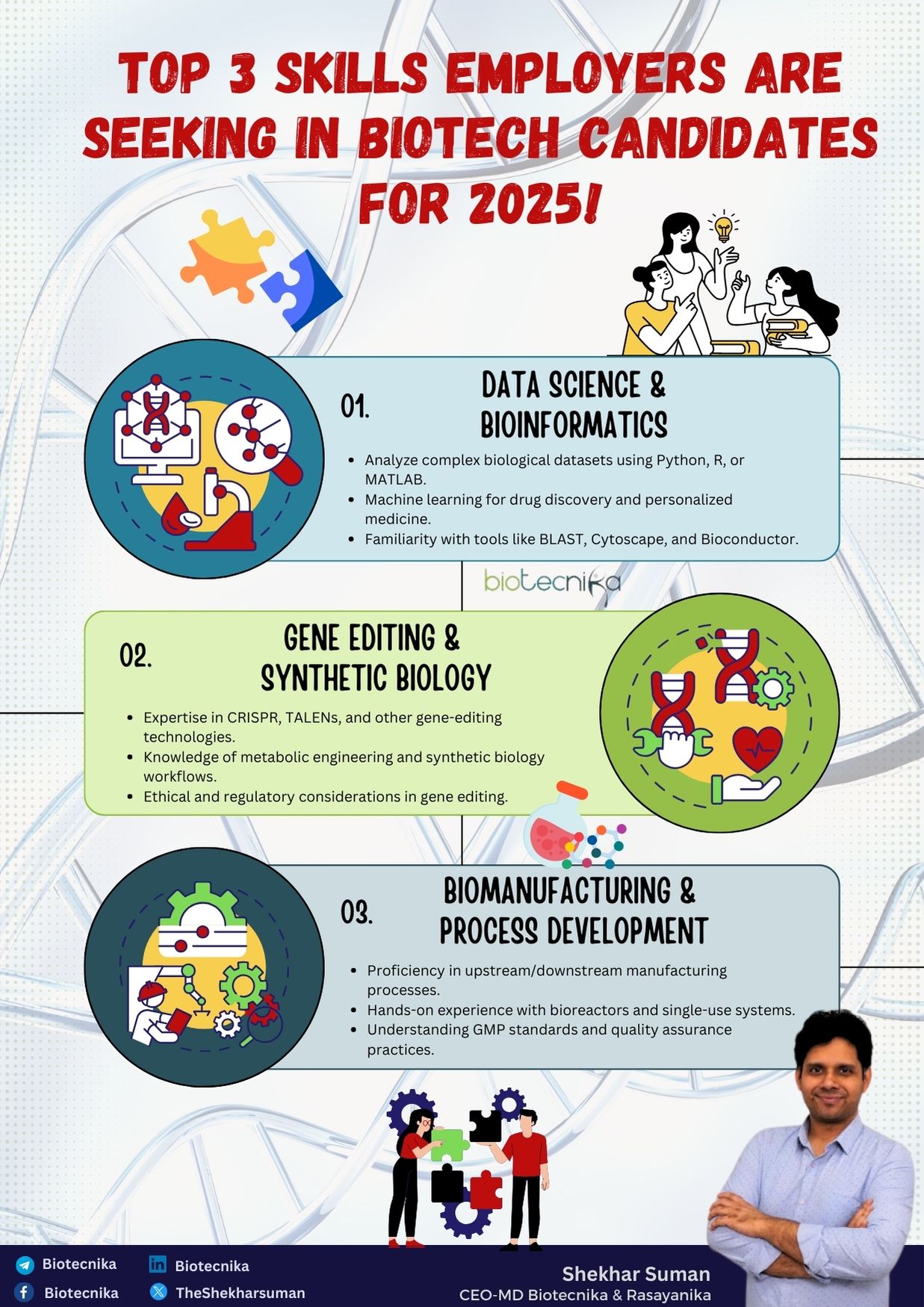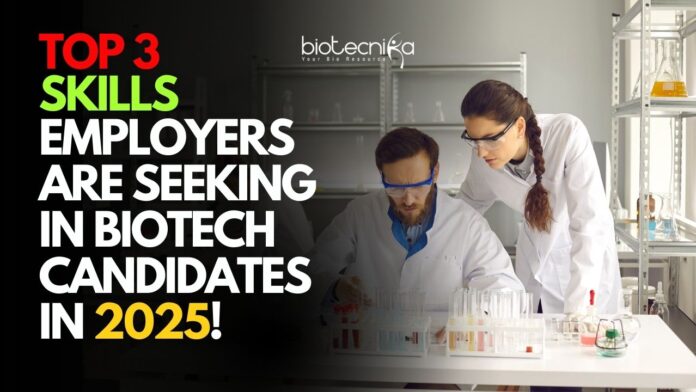Top Skills Biotech Candidates Need in 2025
Do you remember the kind of chaos the COVID-19 pandemic caused? Hospitals were crowded with patients, countries imposed lockdowns, and there was an urgent need to develop treatments and vaccines. The deadly pandemic exposed the vulnerabilities and flaws in health systems worldwide and witnessed the power of Biotechnology such as CRISPR, mRNA vaccine technology, as well as advanced diagnostic tools to combat the virus.
Now, imagine a future where any pandemic can be prevented well before it could start. Imagine if researchers and scientists could detect any pathogen or virus in its early stages. What if they could examine and analyze its structure, as well as develop vaccines and treatments before the pathogen outbreak could occur?
With advancements in Biotechnology, the vision of pandemic prevention is becoming a reality. Biotechnology is empowering scientists and researchers to analyze pathogenic genomes, track mutations, and predict virus transmission. During COVID-19, it was critical in monitoring variations such as Delta and Omicron, and it is now tracking other infections such as influenza and animal coronavirus.
A proactive approach like this could transform global health. With tools such as Genome Sequencing and AI, the future is already here , but skilled Biotechnology professionals are essential to make it happen. Employers are seeking professionals who can harness cutting-edge tools to drive the next wave of innovation. Are you one of those Biotechnologist professionals shaping Global Disease Prevention?
The Biotechnology industry is rapidly expanding, addressing global challenges such as Personalized Medicine, Sustainable Manufacturing, and Climate-Resilient Crops. To drive this revolution forward, Biotechnology professionals must blend creativity with technical expertise. Mastering the following key skills will set you apart and make you an invaluable asset in the Biotechnology workforce.
Let’s look into the top 3 essential skills, analyze them, and explore why they are reshaping the Biotechnology horizon and why you must be equipped with these skills in 2025 to grow your career & get high-paying jobs.
- Data Science & Bioinformatics
The rapid digitization of Biological research has transformed Biotech into a data-driven field. Technologies such as high-throughput sequencing, multi-omics studies (genomics, proteomics, and metabolic), and real-time data collection from clinical trials produce massive datasets. Extracting meaningful insights from these data is essential and is executed by Data Science & Bioinformatics expert professionals.
Core Competencies in Data Science & Bioinformatics:
Employers seek skilled professionals who can bridge Computational Science and Biology/Biotechnology. This role involves analyzing, interpreting, and managing large-scale Biological Databases. Some core competencies include:
- Programming Proficiency: Skills in Python, R, and MATLAB for statistical analysis, algorithm development, and simulation modeling.
- Multi-omics Integration: Expertise in merging datasets from Multi-omics integration such as Genomics, Transcriptomics, Metabolomics, and Proteomics to gain Biological insights.
- Machine Learning and AI: Experience in utilizing AI tools to identify patterns in complex datasets, such as finding drug targets and predicting disease progression.
- Data Management: Proficiency in Cloud Computing platforms (Google Cloud and AWS) and Bioinformatics tools like Galaxy, Bioconductor, and BLAST.
- Data Visualization: Professionals should be able to create intuitive visual representations of data utilizing tools such as Tableau, Seaborn, and ggplot2.
Applications:
- Personalized Medicine: Data scientists are developing algorithms to customize medical treatments based on an individual’s Genetic profile. This approach has been successful in oncology and rare genetic disorders.
- Agricultural Biotechnology: Bioinformatics helps analyze crop genomes, drought resistance, or pest resistance and identify traits for improved yield.
- Drug Discovery: AI/ML in Biotechnology is revolutionizing Drug Discovery, rapid identification of potential therapeutic candidates as well as reducing overall expenditure.
Emerging Trends:
- Spatial Transcriptomics: Understanding gene expression in the context of tissue structure, such as utilizing single-cell RNA Sequencing in Cancer research.
- Single-cell Omics: Studying individual cells to unlock secrets about cell differentiation and disease mechanisms.
- Generative AI in Bioinformatics: Utilizing AI in Biotechnology to predict RNA folding patterns and design novel protein structures. It is utilized for protein structure prediction, drug design, and building synthetic datasets to train ML models.
Case Studies:
- Exscientia: utilizes AI/ML for Drug Discovery. Their AI-designed molecules have entered human Clinical Trials.
- Insilico Medicine: applies AI to aging research and Drug Discovery, with a new therapeutic drug for Idiopathic Pulmonary Fibrosis that has entered Clinical Trials.

- Biomanufacturing & Process Development – Top Skills Biotech Candidates
Biomanufacturing & Process Development connects laboratory innovations to large-scale production. It involves optimizing and developing processes for the production of biological products like monoclonal bodies, vaccines, and cell-based therapies. As the industry moves toward more complex products like Gene Therapies and mRNA Vaccines, the need for skilled Biomanufacturing professionals has skyrocketed.
Core Competencies in Biomanufacturing & Process Development:
Employers seek individuals who can design, implement, and manage Bioproduction processes with precision and efficiency. Key skills include:
- Process Design: Understanding Upstream processes (such as Fermentation and Cell Culture) and Downstream processes (such as Chromatography and Purification).
- Single-use Technologies: Familiarity with modular systems and disposable Bioreactors that improve efficiency and reduce contamination risks.
- Regulatory Expertise: Deep understanding of cGMP (current Good Manufacturing Practices), FDA, and EMA regulations.
- Automation and Digitalization: Knowledge of automation tools, such as Robotic Process Automation (RPA), and Data Analytics for real-time monitoring and optimization.
- Quality Assurance: Ensuring safety, product consistency, and compliance with stringent regulatory industry guidelines and standards.
Applications:
- Vaccine Manufacturing: The rapid production and development of COVID-19 vaccines highlighted the importance of efficient and scalable Biomanufacturing processes.
- Cell and Gene Therapy: Companies are developing scalable methods for manufacturing these personalized and complex treatments.
- Industrial Biotechnology: Biomanufacturing is also key to producing Sustainable materials, Bioplastics, and Biofuels.
Emerging Trends:
- Continuous Bioprocessing: Replacing batch processing with continuous systems improves efficiency as well as reduces expenditure.
- Digital Twins: Using virtual simulations of Biomanufacturing processes to optimize performance and troubleshoot issues before physical implementation.
- Green Manufacturing: Developing environmentally Sustainable production methods to reduce waste and energy use.
Case Studies:
- Moderna collaborated with Lonza to rapidly scale up COVID-19 vaccine production utilizing advanced Biomanufacturing techniques like single-use technologies.
- Bluebird Bio optimized Biomanufacturing for Gene Therapies and large-scale production of therapeutics for sickle cell disease.
Top Skills Biotech Candidates Must Have to get Hired.
- Gene Editing & Synthetic Biology
Gene editing and Synthetic Biology are transforming our ability to manipulate and design Biological systems. These fields are unlocking unprecedented opportunities across Healthcare, Agriculture, and Environmental Sustainability.
Core Competencies in Gene Editing & Synthetic Biology:
Gene editing and synthetic Biology demand a combination of technical expertise, creativity, and ethical awareness. Employers value candidates with skills in:
- CRISPR and Gene Editing: Mastery of CRISPR-Cas9, Base-Editing Tools, and TALENs for Precise Genetic Modifications.
- Pathway Engineering: Designing metabolic pathways to produce high-value substances like Biofuels and Pharmaceuticals.
- Synthetic Biology Platforms: Experience with tools like SnapGene, Benchling, and Geneious for designing genetic constructs.
- Ethical and Regulatory Knowledge: Awareness of biosafety protocols, intellectual property, ethical considerations, and regulations.
- Interdisciplinary Collaboration: Working across fields like Bioengineering, Ethics, and Computer Science to innovate responsibly.
Applications:
- Gene Therapies: CRISPR-based therapies address previously untreatable Genetic Disorders such as Muscular Dystrophy and Sickle Cell Anemia.
- Sustainable Agriculture: Gene editing creates crops with improved yield, climate resilience, and resistance to pests.
- Biomanufacturing Innovations: Synthetic Biology enables the manufacturing of expensive or rare compounds, like spider silk and vanilla flavoring, through Engineered microorganisms.
Emerging Trends:
- Prime Editing: A newer, more precise gene-editing tool that can make targeted changes without cutting DNA.
- Biofoundries: Automated facilities that accelerate the design and testing of synthetic Biology constructs.
- Gene Drives: Technologies for spreading desirable traits in populations, such as disease-resistant mosquitoes, to combat malaria.
Case Studies:
- Vertex Pharmaceuticals and CRISPR Therapeutics are using CRISPR-Cas9 for sickle cell anemia treatments, which can potentially cure genetic disorders.
Biotechnology is no longer confined to the lab—it’s a critical player in addressing global challenges, from Healthcare inequities to Climate Change. Professionals with expertise in Data Science & Bioinformatics, Biomanufacturing & Process Development, and Gene Editing & Synthetic Biology are not just highly sought after; they are driving the industry’s future.
By mastering these skills, you position yourself at the cutting edge of an industry that is shaping humanity’s future. Whether you’re decoding the secrets of the human genome, optimizing vaccine production, or designing the next breakthrough in gene editing, your contributions can have a profound and lasting impact.
Are you ready to take your Biotechnology career to the next level? Focus on these skills, embrace lifelong learning, and join the revolution transforming the future of science and society.
Read More: These Biotech Jobs are set to boom in 2025, Don’t Miss out
Top Skills Biotech Candidates Need to Know in 2025 – Latest Trends







































Very informative about the latest biotech advancements